BCBA Programs & Schools
Transforming Careers with Accredited BCBA Educational Pathways

Introduction to BCBA Education and Certification
Becoming a Board Certified Behavior Analyst (BCBA) requires a strategic combination of education, supervised fieldwork, and passing a comprehensive certification exam. The landscape of BCBA programs has evolved significantly, particularly with the recognition of accreditation standards that ensure quality and adherence to professional benchmarks. This article explores the various accredited programs, their curriculum, admission pathways, and how they prepare students for successful careers in applied behavior analysis (ABA). Additionally, we will compare program quality, online options, and career opportunities, providing prospective students with a comprehensive understanding of their educational journey.
Standards and Recognition in BCBA Education
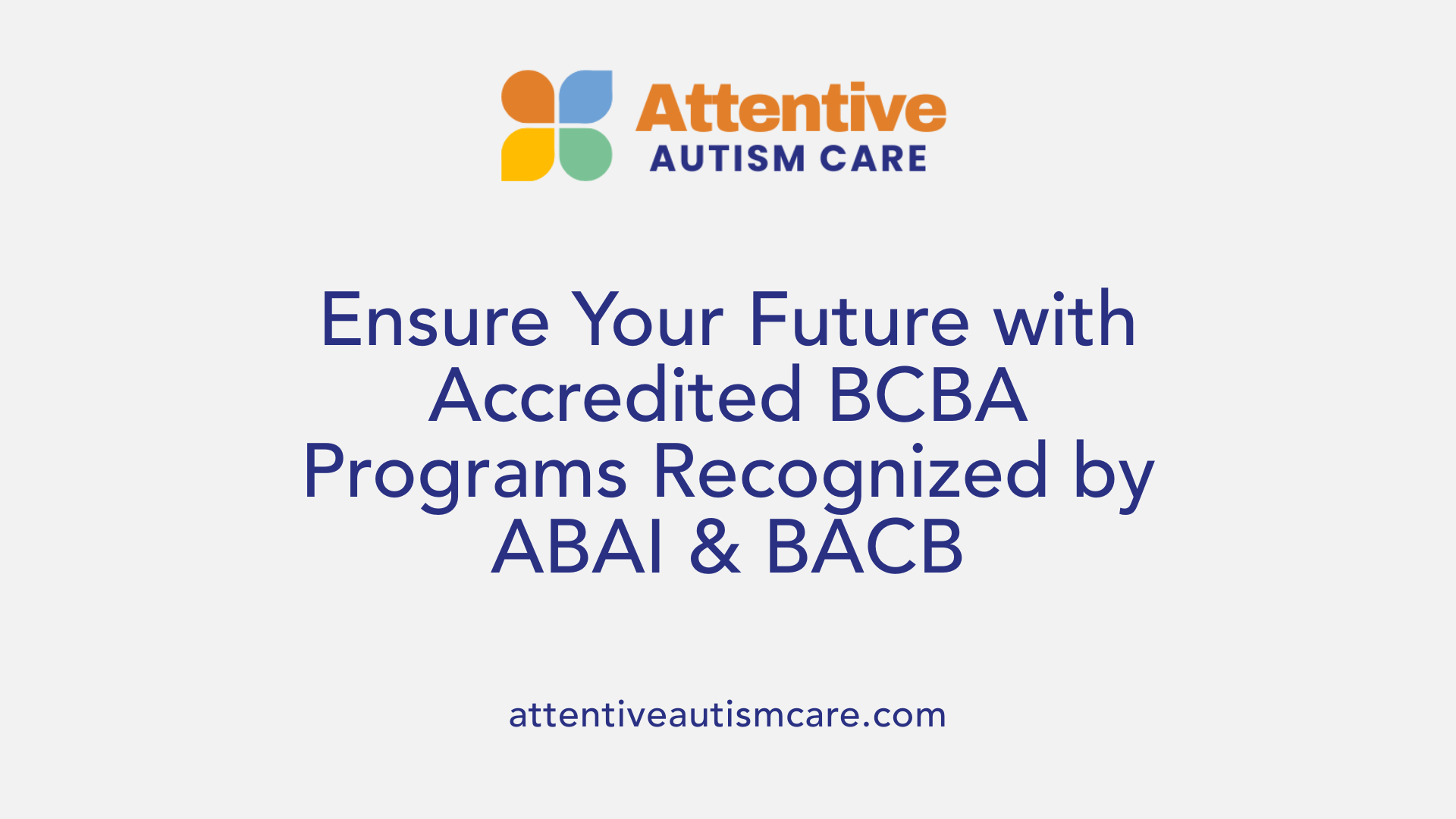
Are there accredited BCBA programs and what is their recognition status?
There are numerous BCBA educational programs that have achieved accreditation from the Association for Behavior Analysis International (ABAI). These programs span undergraduate, master's, and doctoral levels, and meet strict standards set by ABAI, including curriculum quality, faculty qualifications, and fieldwork requirements.
Since January 1, 2022, accreditation by ABAI has been recognized by the Behavior Analyst Certification Board (BACB). This means that programs accredited by ABAI now automatically satisfy the degree and coursework standards required for BCBA and BCaBA certification. This recognition ensures that students receive a dependable, high-quality education aligned with professional standards.
Many universities across the United States offer these accredited programs, with some notable institutions being Florida Institute of Technology, Ohio State University, and Teachers College Columbia University, among others. The programs often include online, hybrid, and on-campus options, as well as specialized tracks and practicum opportunities, all supporting students in meeting the demands for certification and practice.
This alignment of ABAI accreditation with BACB requirements fosters consistency in behavior analysis education worldwide and provides students with a clear pathway toward becoming certified BCBAs or BCaBAs.
| University | Program Level | Accreditation Body | Recognition Since | Features | Additional Notes |
|---|---|---|---|---|---|
| Florida Institute of Technology | Bachelor's, Master's, Doctoral | ABAI | 2022 | Online and hybrid formats | Prepares students for BCBA exams |
| Ohio State University | Graduate and Doctoral | ABAI | 2022 | Fieldwork opportunities | Emphasizes research & practice |
| Teachers College Columbia | Master's | ABAI | 2022 | Clinical training options | Focuses on ethics & intervention |
Understanding these standards helps prospective students select robust educational pathways aligned with national and international professional norms, ultimately fostering a competent, well-qualified behavior analysis workforce.
Academic Standards and Accreditation of BCBA Programs
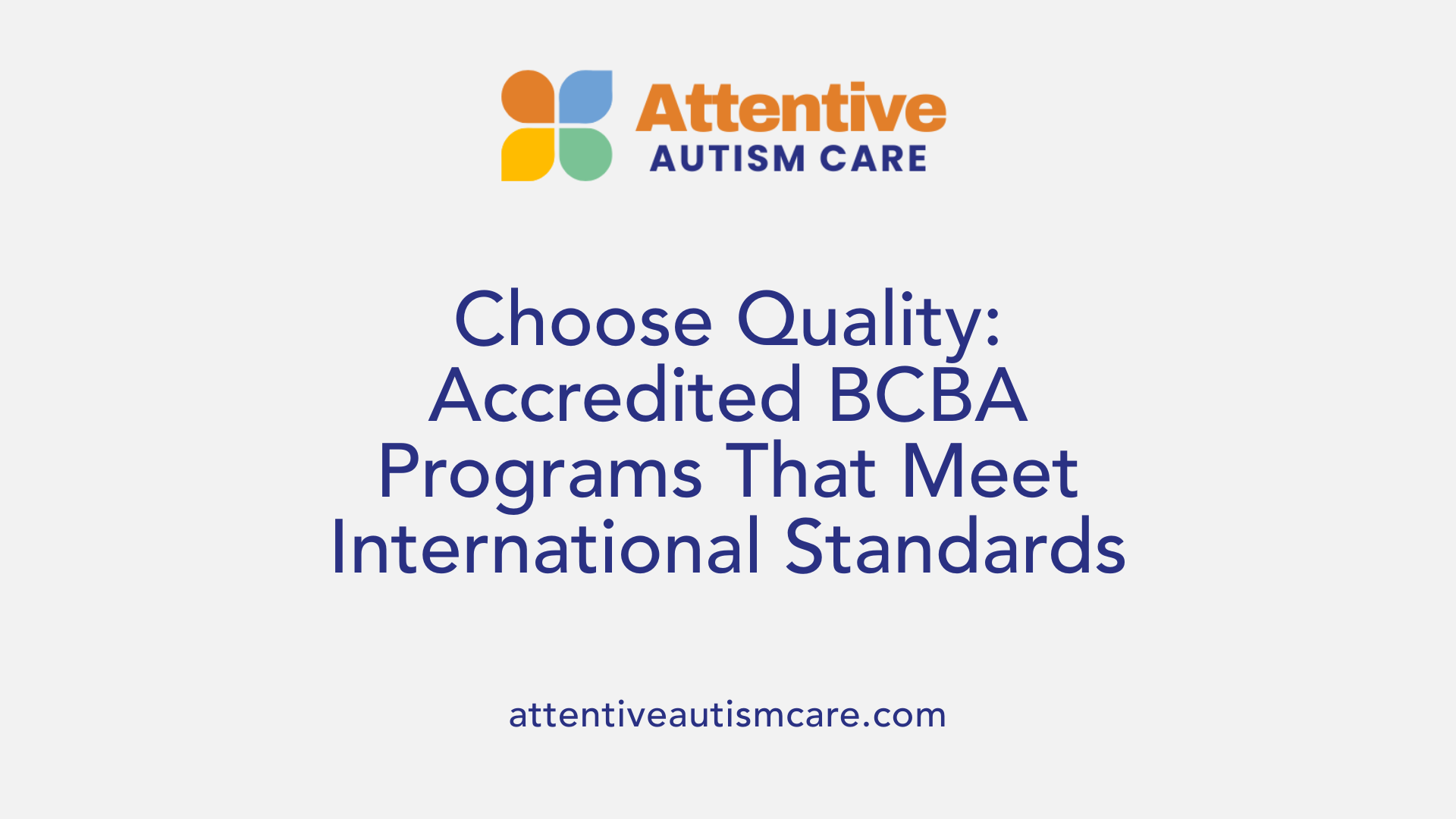
What are accredited BCBA programs and what is their recognition status?
Accredited BCBA programs are educational offerings that meet standards set by the Association for Behavior Analysis International (ABAI) and are recognized by the Behavior Analyst Certification Board (BACB). As of January 1, 2022, this recognition aligns the educational standards across various programs, ensuring consistency and quality for students preparing for BCBA certification.
These programs include bachelor’s, master’s, and doctoral degrees from a variety of recognized universities, such as Florida Institute of Technology, Ohio State University, and Teachers College Columbia University. They adhere to standards that include coursework, supervised practical experience, and research components, all aimed at meeting the requirements for BCBA eligibility.
The process of accreditation involves rigorous evaluation of curriculum content, faculty qualifications, practicum opportunities, and alignment with BACB standards. For prospective students, choosing an accredited program ensures that they receive a high-quality education that prepares them properly for certification exams and professional practice.
Many universities, including McNeese State University and the University of South Carolina, offer programs that satisfy the coursework and practicum requirements necessary to sit for the BCBA exam. These programs typically feature online, hybrid, or on-campus formats, with varying specializations to meet diverse student needs.
In summary, accredited BCBA programs are fundamental in ensuring students acquire the necessary knowledge and skills to excel in the field of applied behavior analysis, with formal recognition that supports their professional credentials and career advancement.
Curricular Content and Coursework in BCBA Programs
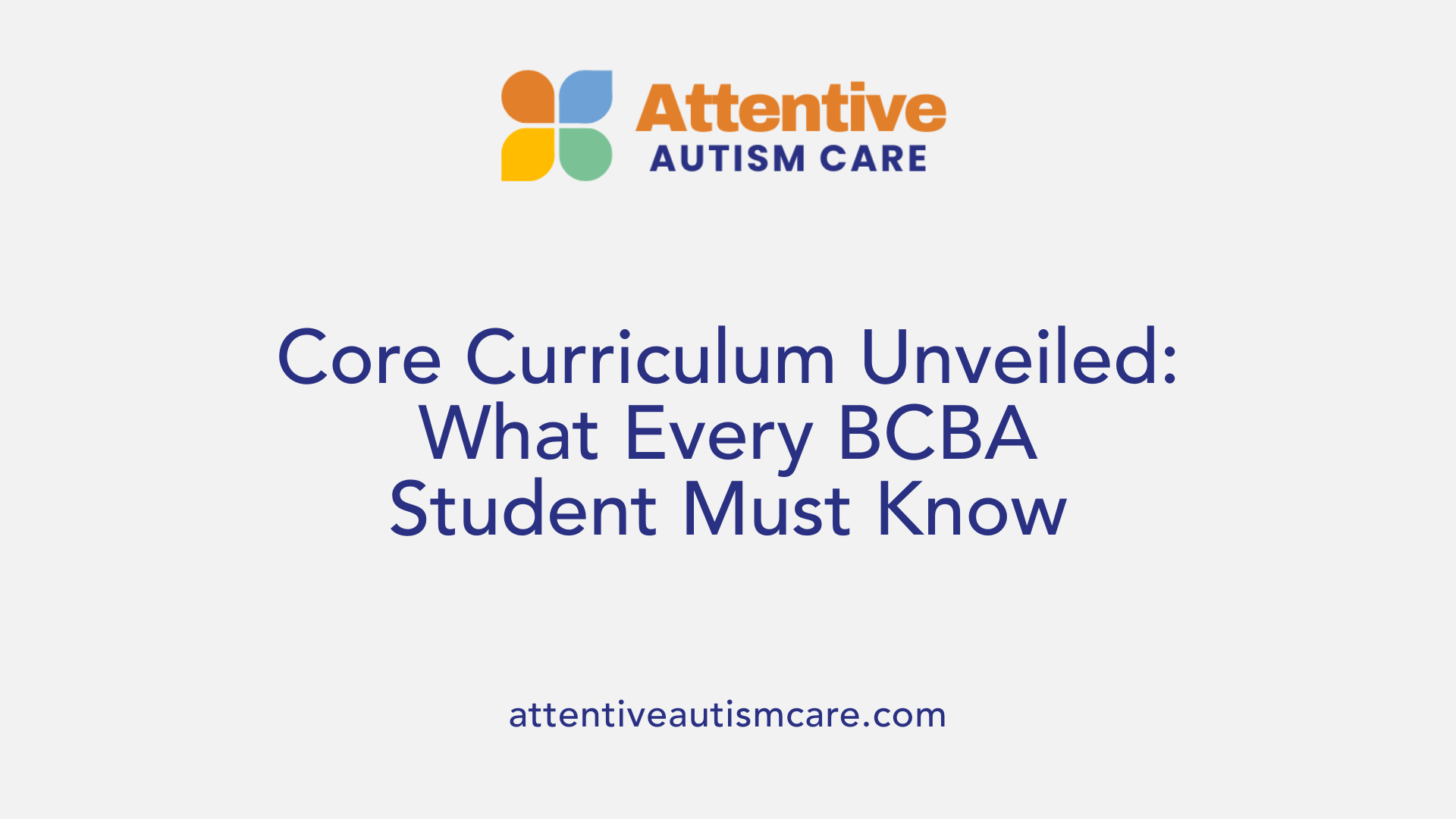
What are the typical curricula and coursework offered in BCBA programs?
BCBA educational programs are designed to meet the rigorous standards set by the Behavior Analyst Certification Board (BACB) and the Association for Behavior Analysis International (ABAI). These programs emphasize core competencies such as applied behavior analysis principles, ethics, measurement, assessment, and intervention.
Most BCBA programs require students to complete around 30 to 39 graduate credits. The curriculum includes essential courses like Behavioral Principles, Behavioral Assessment, Intervention Strategies, and Ethical Practice. Additionally, students undertake supervised practicum or fieldwork to gain practical experience in implementing behavioral interventions and assessments.
Programs often feature coursework verified by ABAI through Verified Course Sequences (VCS), ensuring adherence to BACB standards. When completed, this coursework should provide the foundation for passing the BACB certification exam, which is a requisite step for becoming a licensed BCBA.
The coursework not only covers theoretical knowledge but also emphasizes applied skills, including data collection, analysis, and intervention planning. Many programs incorporate research components, preparing students for evidence-based practice and ongoing professional development.
Depending on the institution, coursework is delivered via on-campus, online, or hybrid formats, providing flexible options for students aiming to meet certification standards.
For prospective students, understanding whether a program’s curriculum aligns with current BACB and ABAI standards is crucial. Verified courses and supervised fieldwork are essential components for eligibility to sit for the BCBA exam.
In summary, BCBA programs offer comprehensive curricula that combine foundational principles, ethical standards, practical skills, and verified coursework required to meet certification requirements, ensuring future behavior analysts are well-prepared for their professional careers.
Entry Pathways and Admission Criteria for BCBA Programs
What are the admission requirements and application procedures for BCBA programs?
Entering a BCBA graduate program typically requires meeting specific academic and practical prerequisites. Most programs necessitate a master's degree, often in applied behavior analysis, psychology, education, or a related field, from an accredited university. Applicants must demonstrate completion of verified coursework in behavior analysis, which aligns with the standards set by the Behavior Analyst Certification Board (BACB).
Supervised fieldwork experience is a critical component — applicants must provide documentation of hours spent in supervision, implementing behavioral interventions, or assessments, usually amounting to a minimum number of hours outlined by the BACB. These supervised experiences ensure that students gain practical skills aligned with their academic learning.
The application process involves several steps. Candidates submit official transcripts, letters of recommendation, and a personal statement or statement of purpose explaining their interest and career goals in behavior analysis. It is essential to document supervised experience hours thoroughly.
Prospective students also need to register and apply through the BACB’s certification portal, where they may need to submit their coursework verification forms and supervised experience hours. Some programs may require an interview or additional testing to evaluate readiness for graduate-level coursework.
Once admitted, students progress through coursework that covers core principles of applied behavior analysis, ethics, assessment, and intervention strategies. Successful completion of these courses, combined with supervised fieldwork, prepares students to take the BACB certification exam. Meeting all these criteria is essential for those seeking BCBA certification and professional practice eligibility.
Many programs also assist students in finding supervised practicum placements and navigating licensing requirements post-graduation, depending on the state regulations.
In summary, applying to BCBA programs involves fulfilling educational prerequisites, acquiring supervised experience, and completing an application process that verifies your preparedness for advanced study, aiming ultimately to qualify for BACB certification and a rewarding career in behavior analysis.
Educational Pathways and Prerequisites to Certification
What educational pathways and prerequisites are necessary to become a BCBA?
Becoming a Board Certified Behavior Analyst (BCBA) involves several educational and experiential steps. Most candidates pursue a master’s degree in applied behavior analysis or a related discipline, such as special education or psychology. Multiple accredited programs across the country, including those at universities like McNeese State University, University of South Carolina, and Hunter College, offer specialized BCBA preparation that align with the Behavior Analyst Certification Board (BACB) standards.
These programs typically include coursework designed to meet or exceed the BACB’s required 270 hours of verified coursework. For example, many programs feature courses like Principles of Behavior Analysis, Ethical Considerations, and Intervention Strategies. In addition to coursework, candidates must complete supervised fieldwork hours, which range from 1,500 to 2,000 hours, depending on the certification level and state requirements.
Numerous university programs provide practicum opportunities, either on-site or through approved remote placements. For instance, Mercy University’s online 21-credit BCBA program offers supervised experience and coursework aligned with BACB standards, focusing on human behavior, intervention planning, and progress monitoring.
Once coursework and supervised experience are completed, candidates apply through the BACB to sit for the certification exam. Passing this exam designates them as a BCBA. Ongoing certification requires maintaining the credential through continuous professional development units (CEUs), adherence to ethical standards, and renewing certification regularly.
Overall, the pathway to becoming a BCBA is structured but flexible, allowing candidates to choose from diverse program formats, including online, hybrid, and on-campus options. This ensures that professionals from various backgrounds and locations can access quality training aligned with the latest behavioral analysis standards.
Diverse Program Offerings and Delivery Models
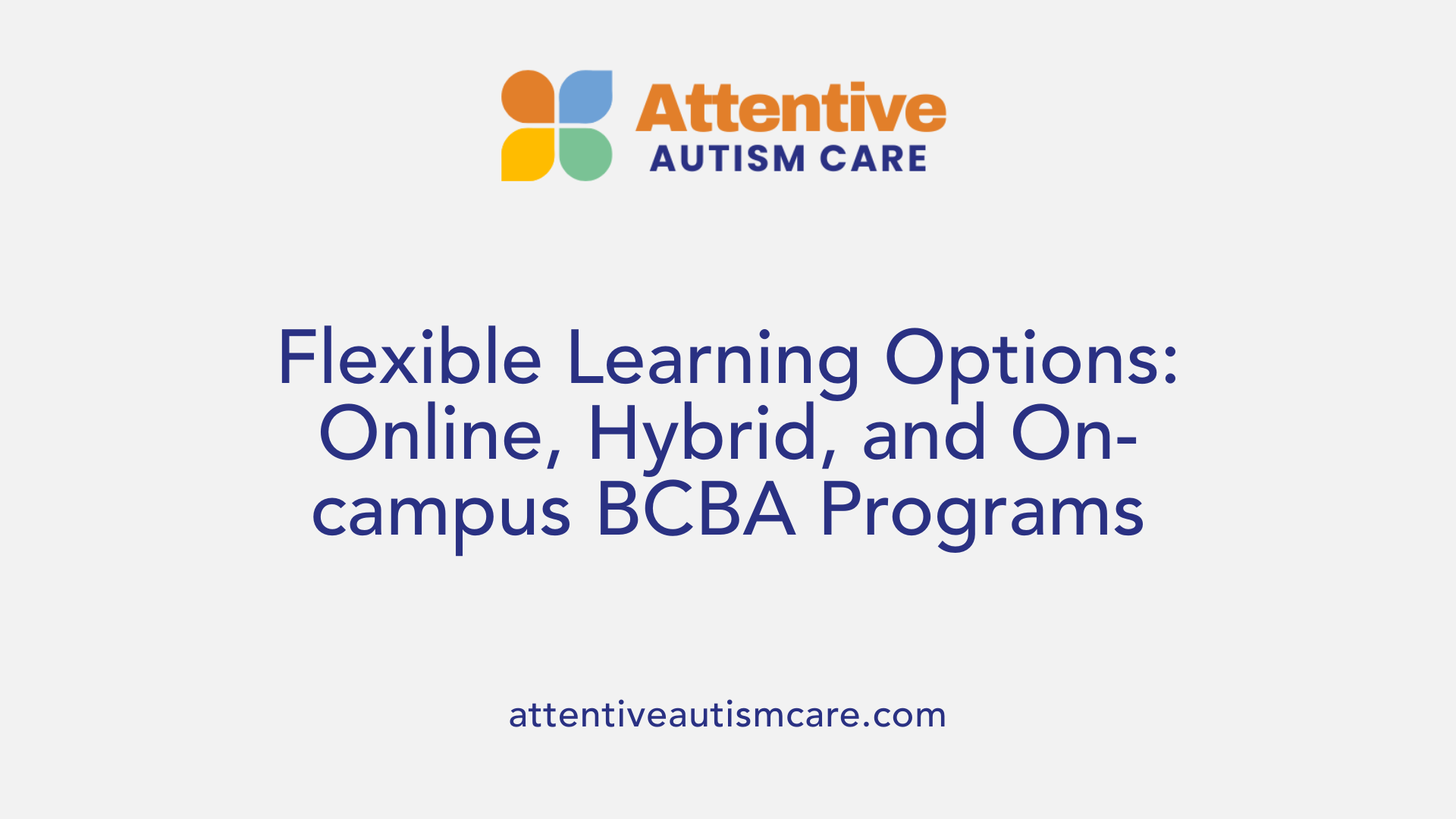
What online BCBA education options are available?
Several online options for BCBA education are verified by the Association for Behavior Analysis International (ABAI) and comply with the standards set by the Behavior Analyst Certification Board (BACB). These programs include master’s degrees, graduate certificates, and specialized training courses offered by reputable universities such as Florida Institute of Technology, Arizona State University, and others.
These online programs typically feature comprehensive coursework in applied behavior analysis, supervised fieldwork components, and practicum opportunities. This flexibility allows students to pursue certification requirements without relocating, making them accessible to a broader range of learners.
Many of these programs are designed to meet the BACB’s 5th Edition standards, ensuring that students acquire the necessary knowledge and skills to qualify for the BCBA exam. They often combine asynchronous learning with synchronous support, providing an engaging and accessible educational experience.
In summary, prospective students can choose from a variety of verified online BCBA programs that combine rigorous academic content with flexible delivery, ensuring they are well-prepared for certification and professional practice.
Diverse modes of program delivery
Universities employ different formats to cater to students’ needs:
| Program Type | Delivery Mode | Features | Example Institutions |
|---|---|---|---|
| In-person | Fully on-campus | Clinical training, face-to-face interaction | McNeese State University, Georgia State University |
| Online | Fully online | Self-paced modules, virtual supervision | Florida Tech, University of Cincinnati |
| Hybrid | Mix of online and on-campus (synchronous or asynchronous) | Flexibility with scheduled on-site training | University of South Carolina, Pepperdine University |
| Synchronous online | Live virtual classes and interaction | Real-time seminars, group discussions | Hunter College, UNC Charlotte |
Special features and areas of focus
Many programs offer specialized tracks or features, including:
- Clinical training and practicum placements in diverse settings
- Research opportunities and thesis work
- Online and hybrid formats for accessibility
- Focus areas such as autism spectrum disorders, educational settings, or healthcare facilities
Program features are designed to prepare students for BCBA certification while also offering specialization options to align with professional interests.
With the variety of options, students can select the program format that best suits their schedule, learning style, and career goals, ensuring a comprehensive education in applied behavior analysis.
Program Comparison and Quality Assessment
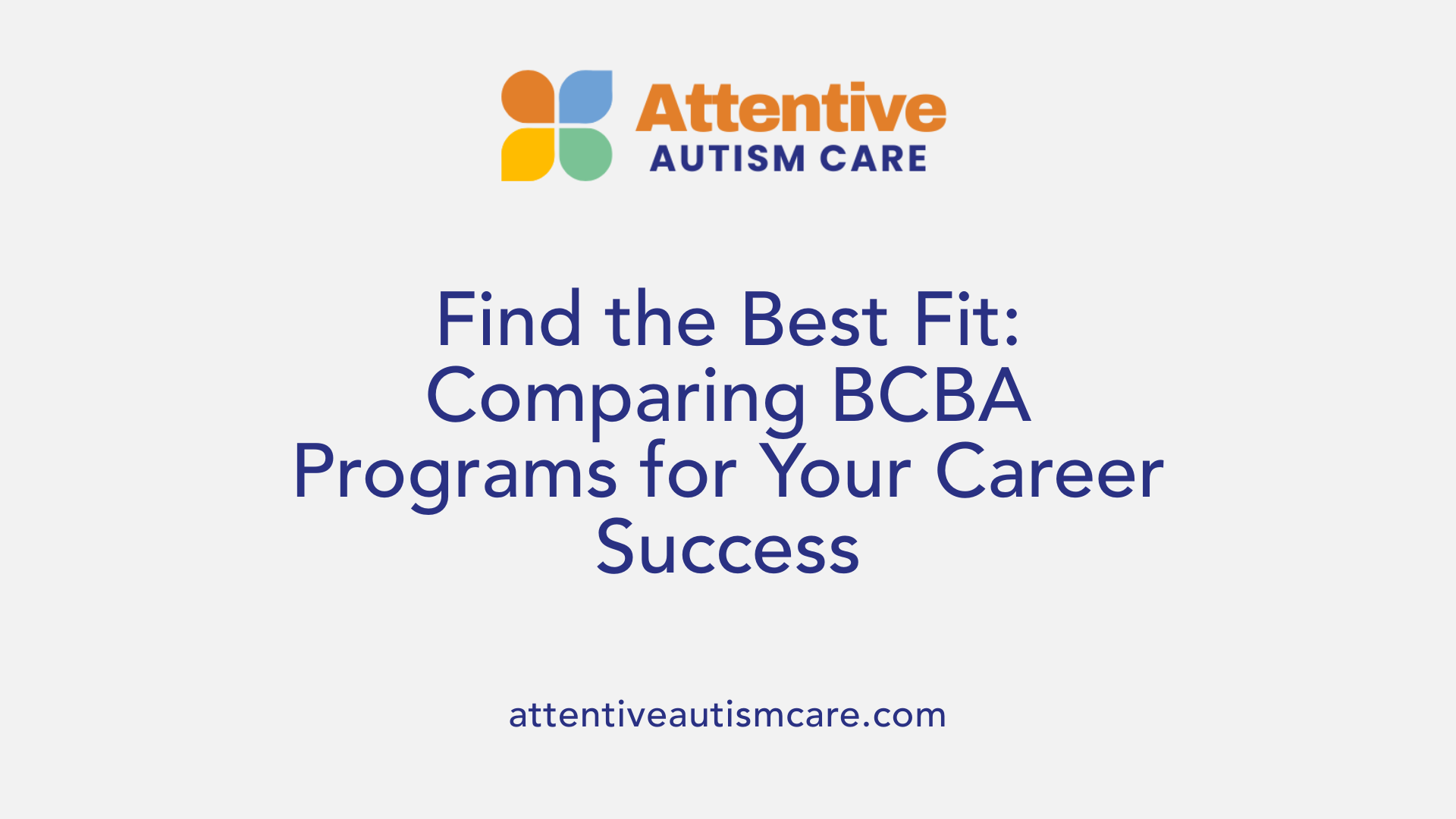
How do different BCBA programs compare in terms of rankings and quality?
Assessing BCBA programs involves looking at several factors, including accreditation status, faculty expertise, research output, and student outcomes. Programs accredited by recognized bodies like ABAI and recognized coursework sequences indicate reliability and adherence to professional standards.
Schools with faculty who are active researchers and published authors tend to offer a richer learning environment. High pass rates on certification exams and successful alumni placements are good indicators of program effectiveness.
Cost and program flexibility are also important considerations. Online formats and part-time options provide greater access for diverse students, while resources like practicum opportunities and student support services enhance educational experience.
Here's a summary of features used to compare programs:
| Criteria | Description | Examples |
|---|---|---|
| Accreditation | Ensures program meets professional standards | ABAI accreditation, verified course sequences |
| Research & Faculty | Faculty active in ABA research; publication records | USC, Georgia State University |
| Student Outcomes | Certification exam passes, employment rates | McNeese State, Hunter College |
| Cost & Flexibility | Tuition, online vs. campus, part-time options | UNC Charlotte, California State University Stanislaus |
| Practical Opportunities | Supervised fieldwork, practicum availability | McNeese Autism Program, Fresno Pacific University |
In conclusion, choosing a program depends on aligning personal needs with program quality markers like accreditation, faculty expertise, and available resources. Prospective students should compare these aspects to ensure they select a reputable and suitable educational pathway for becoming a qualified BCBA.
Duration and Investment in Becoming a BCBA
What is the typical duration of college education needed to become a BCBA?
Achieving certification as a Board Certified Behavior Analyst (BCBA) involves a structured educational path. It generally takes about six to eight years, beginning with a bachelor's degree, which typically takes four years. Afterward, students must complete a master’s degree in applied behavior analysis or a related field, which takes an additional two to four years.
During or after completing their degree, aspiring BCBAs must undertake supervised fieldwork, gaining practical experience through internships or practicum placements. This step is crucial and is often integrated into master’s programs or completed separately.
Finally, candidates prepare for the BCBA certification exam, which tests their knowledge and application of behavior analysis principles. The entire process requires significant time investment, often encompassing several years of academic coursework, supervised experience, and exam preparation.
Once certified, BCBAs must engage in ongoing continuing education and ethics training to maintain their certification. This lifelong learning ensures practitioners stay current with the latest standards, innovations, and best practices in the field.
This thorough and extended training pathway ensures that BCBA professionals are well-prepared to provide effective behavioral interventions in diverse settings and to uphold the high standards of the profession.
Professional Opportunities and Salary Expectations
What salary can BCBA professionals expect?
Certified Behavior Analysts (BCBAs) generally earn competitive salaries that reflect their specialized skills and level of experience. On average, BCBAs in the United States make about $89,075 annually.
However, salary ranges can vary widely depending on factors like geographic location, industry, and years of experience. In high-demand regions such as major metropolitan areas, salaries can be significantly higher, reaching over $125,000. Conversely, entry-level positions or those in less competitive markets might start around $47,500.
The career outlook for BCBAs remains strong, with continued growth driven by increasing demand for behavioral health services, particularly in autism spectrum disorder interventions, educational settings, and healthcare.
In terms of career development, experienced BCBAs can evolve into supervisory roles, program directors, or move into consulting and research positions, often leading to further salary increases and expanded responsibilities.
| Salary Range | Typical Earnings | Additional Details |
|---|---|---|
| $47,500 | Entry-level positions | Depends on location and employer |
| $89,075 | Average salary | Based on national data |
| $125,000+ | Experienced professionals | In high-demand areas and specialized roles |
This positive salary outlook, combined with the increasing need for qualified behavior analysts, makes BCBA certification a promising career choice.
More about BCBA salary outlook and career prospects
How BCBA Programs Foster Career Advancement
How do BCBA programs prepare students for certification and career advancement?
Behavior Analyst Certification Board (BACB)-recognized programs are designed to thoroughly prepare students for becoming certified BCBAs. These programs provide comprehensive coursework that covers fundamental principles of behavior analysis, including human behavior, intervention planning, and ethics.
In addition to academic coursework, students engage in supervised practical experiences and fieldwork, which are essential for acquiring the hands-on skills needed for real-world application. Many programs, such as the McNeese State University master’s and the University of South Carolina’s M.Ed., incorporate on-site or supervised practicum placements, giving students direct exposure to clinical settings.
Programs also include exam preparation resources, such as practice exams, study guides, and curricula aligned with the BACB’s standards, ensuring students are well-equipped for certification exams like the BCBA.
Beyond certification, these programs foster leadership skills, research capabilities, and opportunities for specialization in areas like autism or educational settings. Many courses are designed to develop critical thinking, problem-solving, and leadership qualities, which are highly valued in advanced behavior analysis roles.
Overall, these tailored training pathways not only prepare students for their certification exams but also position them for career growth, leadership roles, and specialization opportunities in the expanding field of behavior analysis.
Summary and Future Outlook for BCBA Education
As demand for qualified behavior analysts continues to grow, the availability of accredited, flexible, and comprehensive BCBA programs ensures that aspiring professionals are well-equipped to meet industry standards. Ongoing developments in accreditation standards, program offerings, and employment opportunities promise a robust future for careers in applied behavior analysis.
References
- Accredited Programs
- Applied Behavior Analysis (BCBA) Program - Mercy University
- Top 57 Best Schools Offering ABA Bachelor's and BCaBA Courses
- Applied Behavior Analysis Psychology Degree Programs | Louisiana
- Applied Behavior Analysis, M.Ed. and BCBA® Certification
- Applied Behavior Analysis - Hunter College - School of Education
- Master of Science in Applied Behavior Analysis
- Applied Behavior Analysis Programs
- Master of Education in Foundations in Behavior Analysis
- M.S. Applied Behavior Analysis - The Chicago School




































































































